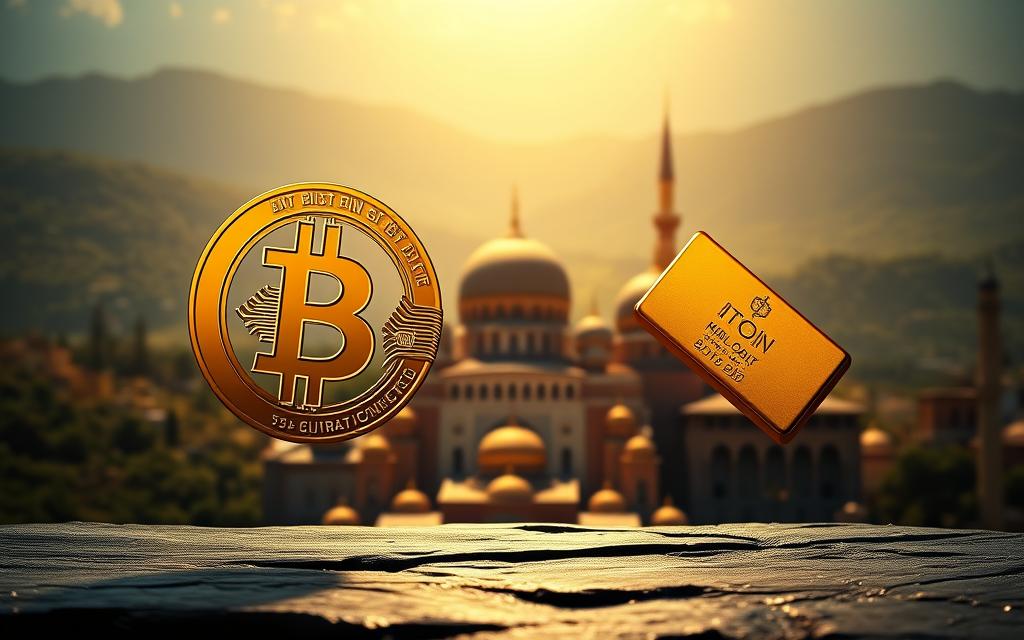Table of Contents
Muslims worldwide debate whether digital assets align with Islamic finance principles. Some view Bitcoin as digital gold, a long-term store of value. Others raise concerns about speculation and volatility.
Projects like Islamic Coin aim to meet Shariah compliance, offering ethical alternatives. Scholars remain divided—does cryptocurrency qualify as Māl (wealth) under Islamic law?
With 1.8 billion Muslims seeking modern finance solutions, clarity is vital. This article explores cryptocurrencies through the lens of faith and ethics.
Introduction to Cryptocurrency and Islamic Finance
Germany’s legal recognition of Bitcoin sparks Shariah debates. Digital assets operate on blockchain technology, a decentralized ledger system. Unlike traditional banks, no central authority controls these transactions.
What Is Cryptocurrency?
Cryptocurrencies like Bitcoin function as a medium exchange. They rely on cryptographic security to prevent counterfeiting. Each transaction is recorded permanently, ensuring transparency.
Key features:
- Decentralized: No government or bank oversight.
- Immutable: Records cannot be altered.
- Global: Accessible with internet access.
Cryptocurrency as Money in Islam
Islamic law requires money to meet Māl criteria—tangible value and utility. Critics argue digital currencies lack intrinsic worth. Others compare them to fiat money, which also fluctuates.
“Bitcoin’s speculative nature mirrors traditional currencies,” stated Mufti Abu Bakar in 2018.
For deeper insights, explore Shariah-compliant cryptocurrency principles.
Key Concerns About Cryptocurrency in Islam
Turkey’s Religious Affairs Directorate recently flagged speculative trading as a violation of Islamic ethics. This reflects broader debates about whether digital assets meet Shariah standards. Below, we analyze five major objections.

1. Element of Gharar (Uncertainty)
Islamic finance prohibits excessive ambiguity in contracts. Meme coins like Dogecoin, with 400% monthly price swings, epitomize *gharar*. Such volatility makes transactions unpredictable, conflicting with Shariah’s emphasis on transparency.
2. Involvement of Riba (Usury)
Earning interest (*riba*) is forbidden. Staking rewards—where users earn passive income—may violate this rule. Scholars debate whether these yields resemble traditional usury or are permissible profit-sharing.
3. Non-Tangible Nature and Intrinsic Value
Gold’s physical backing gives it *intrinsic value*, a key criterion for *Māl* (wealth) in Islam. Cryptocurrencies, however, derive worth solely from market demand. This abstraction raises questions about their legitimacy.
| Asset | Tangibility | Islamic Compliance |
|---|---|---|
| Gold | Physical | Generally Permissible |
| Bitcoin | Digital | Debated |
4. High-Risk Investment and Speculation
Margin trading, common in the *crypto market*, mirrors *gambling* (*maysir*). The IMF warns that 70% of meme coin trades involve *excessive risk*, contravening Islam’s prohibition of speculative ventures.
5. Unregulated Nature and Illegal Activities
Chainalysis data shows $14B in *illegal activities* linked to digital currencies in 2023. Without FDIC protections or centralized oversight, *money laundering* and fraud risks escalate, clashing with Islamic ethical standards.
Expert Opinions: Is Crypto Haram or Halal?
Fatwas on cryptocurrency reveal stark contrasts between traditionalist and progressive interpretations. While some scholars condemn digital currencies as speculative, others endorse them under strict conditions. This divide reflects broader tensions between innovation and adherence to Islamic law.
Scholars Who Declare Crypto Haram
Mufti Taqi Usmani, a leading authority in Islamic finance, argues that Bitcoin resembles “imaginary numbers generated through math.” His 2018 fatwa emphasized the absence of intrinsic value, a core requirement for asset classification under Shariah.
Sheikh al-Haddad echoes these concerns, citing money laundering risks in decentralized systems. Egypt’s Grand Mufti Shawki Allam outright banned cryptocurrency, labeling it a threat to economic stability.
Scholars Who Permit Crypto Under Conditions
Sheikh Abdul Aziz Ibn Baz permitted digital currencies if they function as a medium of exchange, not speculative trade. Mufti Faraz Adam’s analysis of utility tokens (like Ethereum) suggests compliance when tied to real-world services.
“Tokens with clear utility in ecosystems (al-Urf al-Khass) may qualify as permissible,” notes Amanah Advisors’ 2021 report.
The Middle Ground: Crypto as a Digital Asset
Malaysia’s Jumhoor Ulama recognizes blockchain’s potential but warns against volatility. Dubai’s Virtual Asset Regulatory Authority (VARA) offers a hybrid model—regulating trade while allowing innovation.
| Region | Position | Key Condition |
|---|---|---|
| Egypt | Prohibited | Lacks intrinsic value |
| Malaysia | Conditional | Non-speculative use |
| UAE | Regulated | VARA compliance |
NFTs add complexity—some scholars approve them as digital ownership certificates, while others reject speculative resale. The debate continues as technology evolves.
Cryptocurrency and Shariah Compliance
Innovative blockchain solutions are reshaping Islamic finance by aligning decentralized systems with Shariah principles. Projects like HAQQ and Bahrain’s Rain exchange demonstrate how digital assets can meet ethical standards while leveraging technology.

Blockchain Technology and Islamic Principles
Decentralized consensus mechanisms mirror Islamic *shura* (consultation), eliminating reliance on a central authority. HAQQ’s governance model, for instance, distributes decision-making among validators—akin to collective deliberation in Islamic finance.
The nature of cryptocurrencies as transparent, immutable ledgers also aligns with Islam’s emphasis on honesty in transactions. Unlike traditional banking, blockchain’s public records reduce *gharar* (uncertainty) in contracts.
Shariah-Compliant Crypto Projects
Several initiatives bridge faith and technology:
- HAQQ Blockchain: Automates Zakat distribution, directing 10% of new coins to Islamic charities via Evergreen DAO.
- Rain Exchange: Bahrain’s platform holds AAOIFI certification, ensuring compliance with profit-sharing rules.
- Gold-Backed Tokens: Assets like XAUt tie value to physical gold, satisfying *Māl* requirements.
Malaysia’s Securities Commission mandates Shariah-compliant finance standards for digital offerings, while the UAE’s ADGM framework balances innovation with ethical oversight. These models highlight how Islamic finance can evolve without compromising core principles.
Types of Cryptocurrencies and Their Islamic Status
The Islamic status of digital currencies varies based on their design and use cases. Some align closely with Shariah principles, while others face criticism for speculative *activities*. Below, we analyze three major categories.

Bitcoin as “Digital Gold”
Bitcoin’s 21 million supply cap mirrors gold’s scarcity, a key factor in Islamic finance. Scholars debate whether its digital nature disqualifies it as *Māl* (wealth). Proponents argue its fixed supply reduces *uncertainty*, akin to gold’s historical role.
Critics highlight price volatility as a *risk*. The UAE’s fatwa on solar-powered mining suggests environmental ethics may influence rulings.
Meme Coins and Speculative Trading
Tokens like Shiba Inu surged 48,000,000% in 2021 but lack real-world utility. Such *market* behavior resembles *gambling* (*maysir*), forbidden in Islam. Dogecoin’s 30-day trading volume dwarfs merchant adoption, highlighting speculation.
| Asset | Shariah Concern | Status |
|---|---|---|
| Bitcoin | Volatility | Debated |
| Shiba Inu | Pure Speculation | Non-compliant |
| IslamicCoin | ESG Governance | Compliant |
Utility Tokens and Their Permissibility
Ethereum’s smart contracts enable halal *investment* in services like Filecoin’s storage solutions. Unlike meme coins, these tokens derive value from tangible *activities*. Saudi Aramco’s supply chain tokens further demonstrate ethical use cases.
“Proof-of-stake tokens may align better with Islamic finance by avoiding energy waste,” notes Sheikh Al-Mansoori.
Projects like IslamicCoin integrate Zakat distribution, blending technology with faith-based obligations. This contrasts sharply with PepeCoin’s purely speculative model.
Practical Guidance for Muslim Investors
Navigating digital assets while adhering to Islamic principles requires careful evaluation. With growing concerns about volatility and compliance, investors need clear strategies. This section provides actionable steps to identify permissible opportunities.

How to Evaluate Halal Cryptocurrencies
Follow this 5-step screening process to assess Shariah compliance:
- Check intrinsic value: Does the asset serve a real-world purpose? Utility tokens like Ethereum often pass this test.
- Review transaction history: Avoid coins linked to prohibited activities (gambling, alcohol).
- Assess governance: Platforms like Wahed Invest filter assets using Dow Jones Islamic Market standards.
- Analyze risk levels: High volatility may indicate gharar (excessive uncertainty).
- Verify profit mechanisms: Staking rewards must avoid interest-based models.
“Islamic finance demands transparency in both asset backing and profit distribution,” notes Malaysia’s Securities Commission.
Alternatives to High-Risk Crypto Trading
Consider these Shariah-compliant options:
- Gold-backed tokens: XAUt and similar assets mirror gold’s tangible value.
- Sukuk bonds: Yield 4-6% annually without interest concerns.
- Waqf platforms: Malaysia’s Finterra enables blockchain-based charitable giving.
| Option | Return Potential | Shariah Compliance |
|---|---|---|
| Bitcoin | High volatility | Debated |
| Sukuk bonds | 4-6% fixed | Certified |
| Trade finance solutions | 8-12% | Saudi National Bank approved |
Dubai’s AAOIFI-compliant OTC desks offer regulated exchange services. For those questioning whether digital assets align with faith, gold-pegged tokens provide a middle ground.
Conclusion: Navigating Crypto in Islamic Finance
Bahrain’s progressive stance on cryptocurrencies reflects shifting attitudes in Muslim-majority nations. While speculation raises halal concerns, blockchain’s utility for Zakat automation offers promise.
GCC regulators now blend innovation with Islamic finance principles. The UAE’s VARA and Bahrain’s Rain exchange set benchmarks for ethical value creation.
Individual scholar consultations remain vital. Projects like HAQQ prove decentralized tech can align with faith when nature avoids excessive risk.
As the sector grows to $128B by 2025, a balanced approach—embracing innovation cautiously—will define halal digital asset adoption.
FAQ
Does Islamic finance allow cryptocurrency transactions?
Opinions vary among scholars. Some consider it permissible if compliant with Shariah principles, while others reject it due to concerns like uncertainty and excessive risk.
Why is Bitcoin debated in Islamic finance?
Bitcoin lacks intrinsic value and operates without central authority, raising concerns about riba (usury) and gharar (uncertainty), which conflict with Islamic financial principles.
Are there Shariah-compliant digital assets?
Yes, certain projects align with Islamic law by avoiding interest, speculation, and unlawful activities. These focus on utility and transparent transactions.
Can trading cryptocurrencies be considered gambling?
If transactions involve excessive speculation or unclear terms, they may resemble gambling (maysir), which is prohibited. Responsible investment minimizes such risks.
How can Muslim investors assess halal crypto opportunities?
They should verify compliance with Islamic finance rules, avoid high-risk speculation, and prioritize projects with tangible benefits and ethical use cases.
What role does blockchain play in Islamic finance?
Blockchain enhances transparency and security, supporting fair transactions. When designed ethically, it can align with Islamic financial principles.
Are stablecoins more acceptable than volatile cryptocurrencies?
Some scholars view stablecoins as less risky due to price stability, but compliance still depends on underlying assets and transaction fairness.









